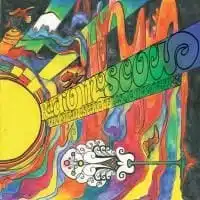
Retro-rock has seen a slight resurgence during the past few years. The Black Keys’ Brothers, one of the finest records of last year, was a blues-drenched, distortion-heavy affair that sounded authentically like classic blues-rock. As for this year, look to Girls’ Father, Son, Holy Ghost which, while very indie, is very retro in its own right, ranging from Deep Purple-like riffing to melancholy blues. Both of those bands, however, are notable for taking classic genres and re-interpreting them through contemporary genres; they don’t sound like tribute bands by any means. These two examples aside, there are some bands who do sound like they’re in something of a time warp. Bands who, while paying tribute to the genres that they’re indebted to, sound as if they would have been more comfortable living thirty to forty years ago than now.
Enter Radio Moscow.
This band’s heavy classic rock, psychedelic, and blues influences are evident every second of The Great Escape of Leslie Magnafuzz’s running time. First, there’s the album cover, which looks like an unused piece for a Cream album; its psychedelic color palette does not hide any of the band’s intentions. (I’m sure the mock epic album title pays tribute to something, and is not some sort of incredible innuendo like I first imagined, but I have yet to pinpoint anything specifically). Then there’s the music itself: the entire album is compromised of bluesy guitar jams, with groove-heavy riffs abound. There’s no doubt that Radio Moscow are aware of the history of classic rock. There’s not a moment on this record that gives the listener any doubt that the majority of the band’s record collection is occupied by dusty rock LPs. The fuzzy, slightly hazy distortion that gave Hendrix his fame is utilized quite well by guitarist Parker Griggs (who plays guitar, drums, harmonica, and the leslie organ), and the album’s jam-like tempos are well kept up by bass player Zack Anderson’s rhythms.
This, while indicative of the band’s talent at authentically re-creating the sounds of old-school rock, is also the record’s largest problem. The Great Escape of Leslie Magnafuzz sounds exactly like what it is: a well-executed, classic blues-rock record. Because of this, all of the album’s twelve tracks start to blend together in the mind after the record is done spinning. For the most part, they’re all psychedelic blues jams that, though usually no longer than five minutes on the record, will likely be expanded into fifteen minute blow-out jams in concert. This is unfortunate, given that the album’s often impressive solos begin to drag on during these shorter run times. Live, these songs would blend together into an even more indistinguishable, psychedelic hot mess. Griggs runs his fingers up and down the fret like a devoted Hendrix acolyte, but the music sounds so much like the stuff the band is trying to pay tribute to that the band fails to stand out with their own unique voice. Even when the music begins to recall more contemporary voices, like the Joe Satriani-esque guitar line on “Speed Freak” (a fitting title), the band doesn’t sound like a unique voice providing a fresh take on an old genre. Instead, they sound like a band who are well versed in the typical traits of classic rock, but without any ingenuity.
Despite the grandness of its title, The Great Escape of Leslie Magnafuzz sounds as aged as the genres it pays homage to. Though guitar shredders and die-hard fans of classic blues-rock will find much to like here, as a whole the album sounds worn before it even finishes its running time.

